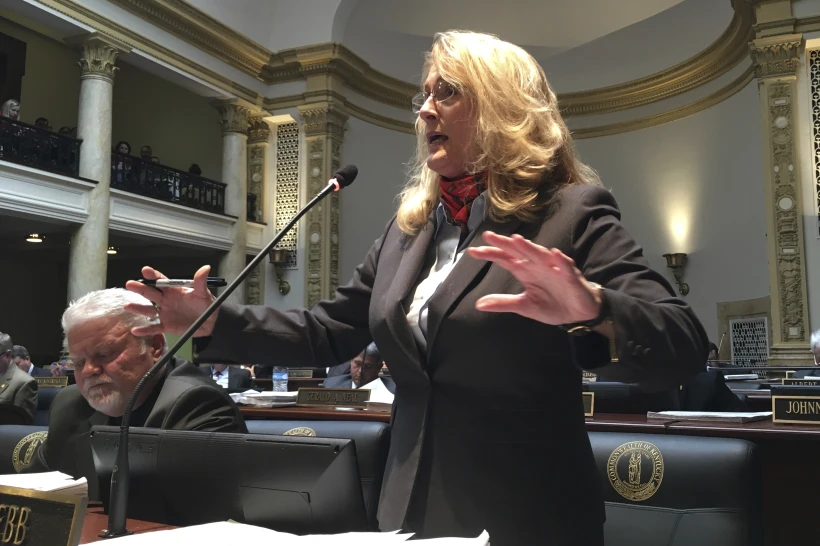Kentucky Democrat State Senator Switches to Republican Party, Citing Ideological Disconnect
By Bruce Schreiner, Associated Press
FRANKFORT, Ky. (AP) — A veteran Kentucky state legislator announced her decision to switch political parties on Friday, bolstering Republican supermajorities and dealing another blow to Democrats working to regain footing in rural areas across the state.
State Senator Robin Webb, whose district encompasses four counties in northeastern Kentucky, disclosed her intention to join the Republican lawmakers who maintain legislative control in the state. As one of the remaining rural Democrats in Kentucky’s General Assembly, Webb’s departure further isolates her former party within urban and suburban constituencies in a state where Republicans dominate vast rural territories.
In a news release, Webb explained her growing alienation from the Democratic Party, which she described as continuing to “lurch to the left.”
“Remaining a Democrat has become untenable and counterproductive to serving my constituents’ best interests,” Webb stated. “I will continue championing rural Kentucky and the eastern Kentucky residents who have shown such loyalty to me and my family.”
Kentucky Democratic Party Chairman Colmon Elridge responded sharply, accusing Webb of aligning herself with a party that seeks to fund tax cuts for wealthy Americans “off the backs of vulnerable” citizens. His statement referenced the multitrillion-dollar tax reduction package recently approved by House Republicans. To offset the resulting revenue shortfall, Republicans have proposed modifications to Medicaid and SNAP food assistance programs. The nonpartisan Congressional Budget Office projects these changes would result in 8.6 million fewer Americans having health insurance coverage and 3 million fewer monthly SNAP recipients.
“If those represent her priorities, then we concur: she isn’t a Democrat,” Elridge declared.
Webb emphasized that her fundamental beliefs remain unchanged, noting, “The only difference today is the letter next to my name.”
Webb brings a distinctly Kentucky background to her political career. She’s an avid hunter and horse enthusiast who transitioned from coal mining to practicing law. Her legislative journey began in 1999 when she entered the Kentucky House during Democratic control. After serving a decade as a state representative, she moved to the GOP-controlled Senate in 2009. Republicans achieved complete legislative dominance following the 2016 elections, riding Donald Trump’s electoral success to capture the Kentucky House. Subsequent elections have strengthened their overwhelming majorities.
Republican gains have largely come through victories in traditionally Democratic rural districts, though Webb’s constituency had remained a Democratic stronghold until Friday’s announcement.
Her party switch leaves Democrats with minimal rural representation in the legislature. Democratic state Representative Ashley Tackett Laferty, who serves an Appalachian district, represents one of the few remaining exceptions.
Governor Andy Beshear, a Democrat serving his second term, demonstrated rural appeal during his 2023 reelection campaign, winning several rural counties while reducing Republican margins in others. His popularity stems from the state’s strong economic performance during his administration and his crisis management during natural disasters, including tornadoes, floods, and the COVID-19 pandemic.
Kentucky Democrats are pursuing rural revival through grassroots engagement, exemplified by the state party’s ongoing “listening tour” with stops in conservative communities statewide.
State Republican Party Chairman Robert Benvenuti characterized Webb’s switch as part of a larger political shift. In 2022, Republican voter registration surpassed Democratic registration statewide.
“Like numerous other Kentuckians, she has recognized that today’s Democratic Party policies and objectives have fundamentally changed and no longer represent the majority of Kentuckians,” Benvenuti commented.
The 2026 legislative session will commence in early January, though Governor Beshear has indicated he may convene a special session this year to address storm-relief funding. Deadly tornadoes struck southeastern Kentucky in May, while flooding affected other parts of the state in April.
*This article is credited to Bruce Schreiner of the Associated Press.*


















Leave feedback about this